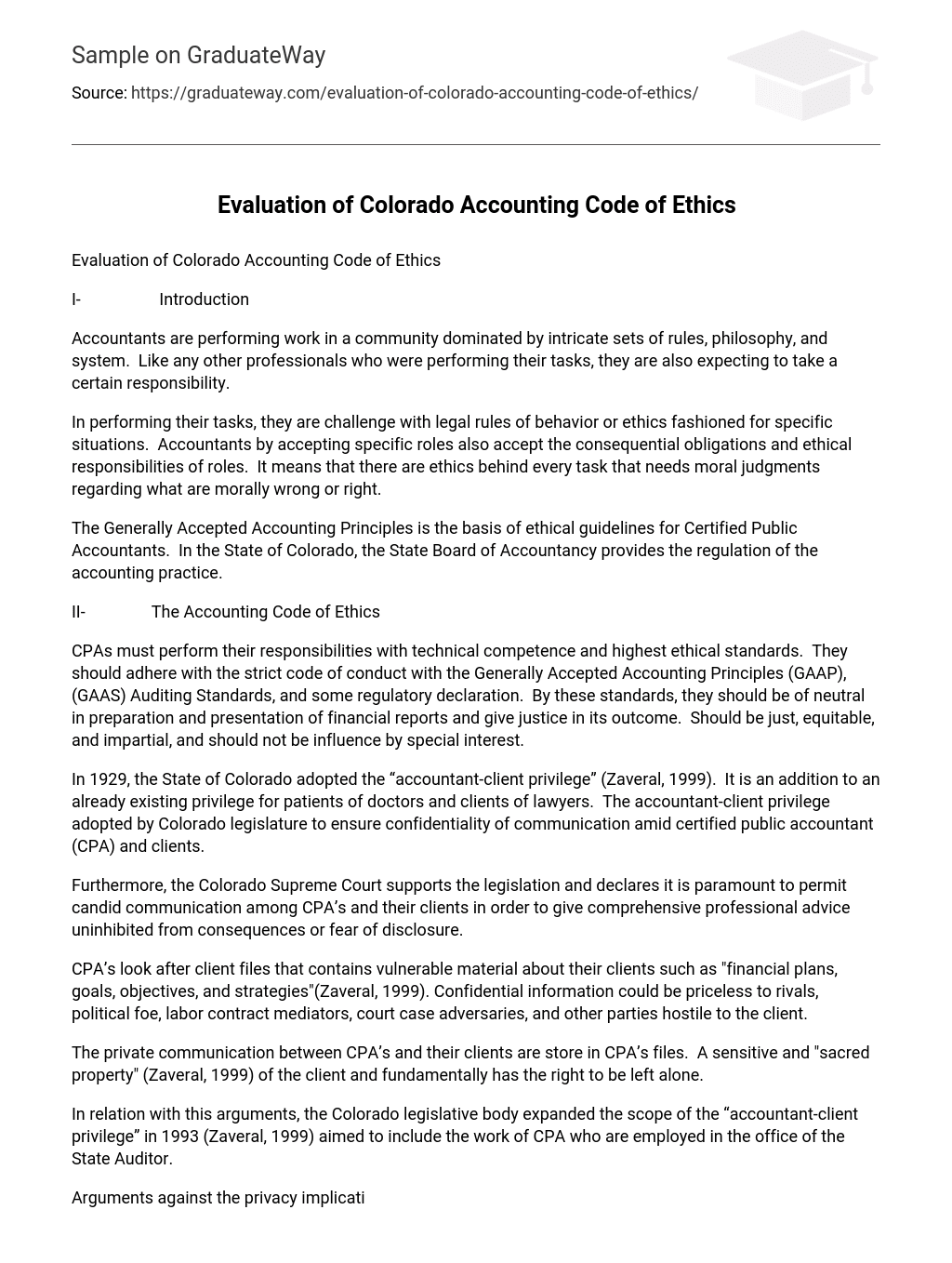I- Introduction
Accountants are performing work in a community dominated by intricate sets of rules, philosophy, and system. Like any other professionals who were performing their tasks, they are also expecting to take a certain responsibility.
In performing their tasks, they are challenge with legal rules of behavior or ethics fashioned for specific situations. Accountants by accepting specific roles also accept the consequential obligations and ethical responsibilities of roles. It means that there are ethics behind every task that needs moral judgments regarding what are morally wrong or right.
The Generally Accepted Accounting Principles is the basis of ethical guidelines for Certified Public Accountants. In the State of Colorado, the State Board of Accountancy provides the regulation of the accounting practice.
II- The Accounting Code of Ethics
CPAs must perform their responsibilities with technical competence and highest ethical standards. They should adhere with the strict code of conduct with the Generally Accepted Accounting Principles (GAAP), (GAAS) Auditing Standards, and some regulatory declaration. By these standards, they should be of neutral in preparation and presentation of financial reports and give justice in its outcome. Should be just, equitable, and impartial, and should not be influence by special interest.
In 1929, the State of Colorado adopted the “accountant-client privilege” (Zaveral, 1999). It is an addition to an already existing privilege for patients of doctors and clients of lawyers. The accountant-client privilege adopted by Colorado legislature to ensure confidentiality of communication amid certified public accountant (CPA) and clients.
Furthermore, the Colorado Supreme Court supports the legislation and declares it is paramount to permit candid communication among CPA’s and their clients in order to give comprehensive professional advice uninhibited from consequences or fear of disclosure.
CPA’s look after client files that contains vulnerable material about their clients such as “financial plans, goals, objectives, and strategies”(Zaveral, 1999). Confidential information could be priceless to rivals, political foe, labor contract mediators, court case adversaries, and other parties hostile to the client.
The private communication between CPA’s and their clients are store in CPA’s files. A sensitive and “sacred property” (Zaveral, 1999) of the client and fundamentally has the right to be left alone.
In relation with this arguments, the Colorado legislative body expanded the scope of the “accountant-client privilege” in 1993 (Zaveral, 1999) aimed to include the work of CPA who are employed in the office of the State Auditor.
Arguments against the privacy implications of the “accountant-client privilege” which claims, “privacy is not a concern and it’s not a present day issue”(Zaveral, 1999) were refuted by surveys and political views from government. In 1998, Vice President Al Gore said, “Americans should have the right to choose which of their personal information is disclosed”(Zaveral, 1999). Colorado’s own government officials also expressed their deep concern over the incursion of government into areas that should be reserved. The Senate resolution (88-0), introduced by Senator Phil Gramm and Colorado’s Senator Wayne Allard urging the government to pull out the invasion rules.
Violations of the accounting code of ethics may result in criminal or civil liabilities. Fraud is the main and common violation of the accounting system that is definitely unethical. Violations of GAAP arising from fraudulent financial reporting, forging records or documents and other deliberate attempts to hide the truth. Intentional act of repressing the effects of concluded transactions, and deliberate strategy to alter information.
Common basis of cases filed in courts resulting to litigation are “overstated net incomes”(KSCOURT, 2003) to cover company’s operational problems. This is done by “accelerating the recording of income”(KSCOURT, 2003) which is a violation of the Generally Accepted Accounting Principles.
III- Conclusion
The State of Colorado strongly supports the accounting code of ethics particularly the “accountant-client privilege” for privacy. However, the Colorado State Board of Accountancy (a state government regulatory board) can easily regulate Certified Public Accountants privilege statute by obtaining client consent to view private information.
The Colorado legislature adoption of the “accountant-client privilege” that sets the control of private financial information in the hands of “clients” and not the State, guarantees fundamental right of privacy. It should continue to ensure the privacy of Colorado general public and business entities.
IV- References
Gordon, Marcy, 2004, Associated Press, [online], http://www.rgj.com/news/printstory.php?id=80948
KSCOURT, 2003, “Appeal from the U.S. District Court for the District of Colorado,” [online], http://www.kscourts.org/ca10/cases/2003/08/02-1208.htm
Zaveral, Frank, 1999,”Private Accountant-Client Relationship,” [online], http://i2i.org/article.aspx?ID=595





